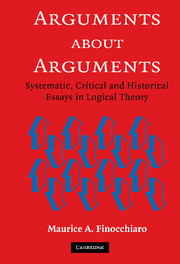Book contents
- Frontmatter
- Contents
- Preface and Acknowledgments
- Introduction : An Approach to a Branch of Logic
- Theorizing about reasoning and argument
- Fallacies and asymmetries
- Critiques
- Historical analyses
- 18 The Concept of Ad Hominem Argument in Galileo and Locke (1974)
- 19 Newton's Third Rule of Philosophizing : A Role for Logic in Historiography (1974)
- 20 Logic and Rhetoric in Lavoisier's Sealed Note : Toward a Rhetoric of Science (1977)
- 21 The Concept of Judgment and Huygens' Theory of Gravity (1980)
- 22 Empiricism, Judgment, and Argument : Toward an Informal Logic of Science (1988)
- 23 Criticism, Reasoning, and Judgment in Science (1995)
- Selected Bibliography
- Index
21 - The Concept of Judgment and Huygens' Theory of Gravity (1980)
from Historical analyses
Published online by Cambridge University Press: 05 February 2015
- Frontmatter
- Contents
- Preface and Acknowledgments
- Introduction : An Approach to a Branch of Logic
- Theorizing about reasoning and argument
- Fallacies and asymmetries
- Critiques
- Historical analyses
- 18 The Concept of Ad Hominem Argument in Galileo and Locke (1974)
- 19 Newton's Third Rule of Philosophizing : A Role for Logic in Historiography (1974)
- 20 Logic and Rhetoric in Lavoisier's Sealed Note : Toward a Rhetoric of Science (1977)
- 21 The Concept of Judgment and Huygens' Theory of Gravity (1980)
- 22 Empiricism, Judgment, and Argument : Toward an Informal Logic of Science (1988)
- 23 Criticism, Reasoning, and Judgment in Science (1995)
- Selected Bibliography
- Index
Summary
Judgment in Science and in Philosophy of Science
The concept of scientific judgment has been constantly gaining currency in the philosophy of science. Though not yet so current as to have found its way into the main metascientific topics of Current Research in Philosophy of Science (Asquith and Kyburg 1978), the neglect is hardly surprising since the inclusion (to use Kant's beginning words in the Prolegomena) “must wait till those who endeavor to draw from the fountain of reason itself have completed their work; it will then be the turn of these [collections] to inform the world of what has been done” (Kant 1950, 3). Among those who are presently endeavoring “to draw from the fountain of reason” are Marx Wartofsky (1978), who regards the concept of judgment to be the key to the understanding of scientific discovery and creativity; Thomas Kuhn (1977), who regards it as essential in the process of theory choice; Harold Brown (1977, 145–51), for whom judgment is the central feature of scientific rationality; Thomas Nickles (1980, 39, 43–44), who takes it to be one of the main points of the transition from logicality to rationality; the present author (1977a, 95–96), for whom judgment is the positive, constructive, and defensible side of Feyerabend's move from method to anarchism; Joseph Weizenbaum (1976), whose critique of computer technology suggests a move from calculation to judgment; and Gerald Holton (1973; 1978), whose thematic analysis of scientific thought will be seen below to be intimately related to judgmental analysis.
Information
- Type
- Chapter
- Information
- Arguments about ArgumentsSystematic, Critical, and Historical Essays In Logical Theory, pp. 361 - 385Publisher: Cambridge University PressPrint publication year: 2005
